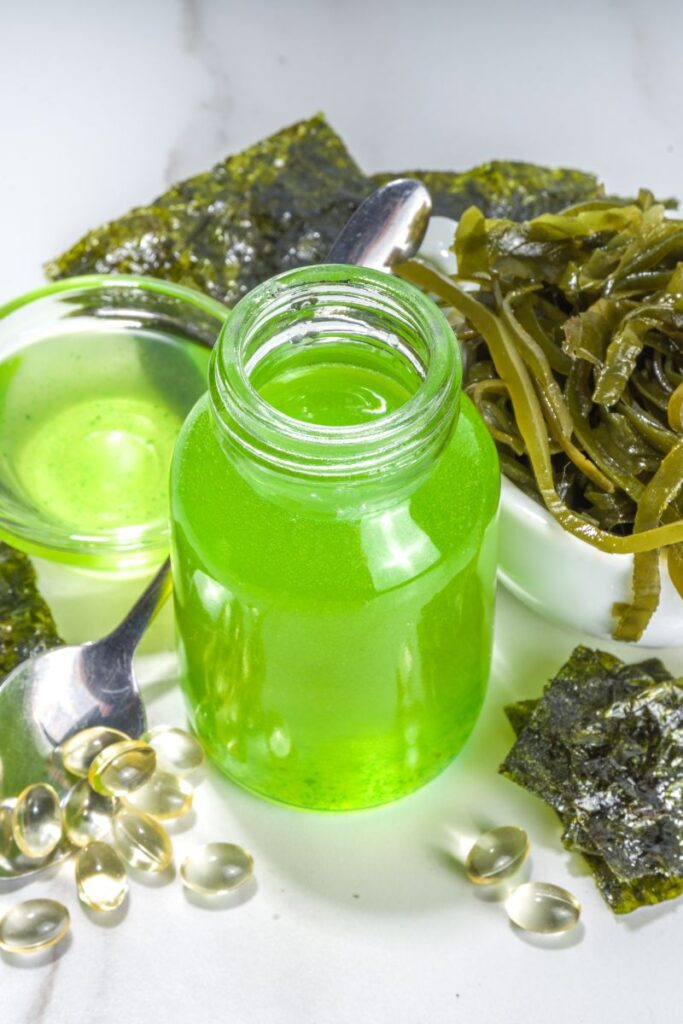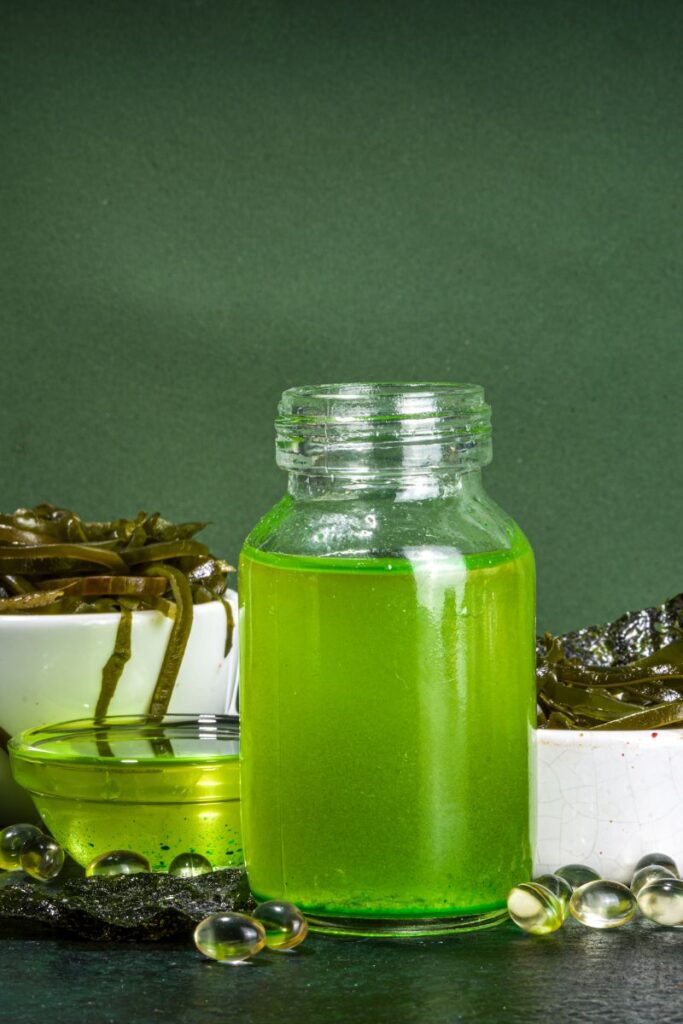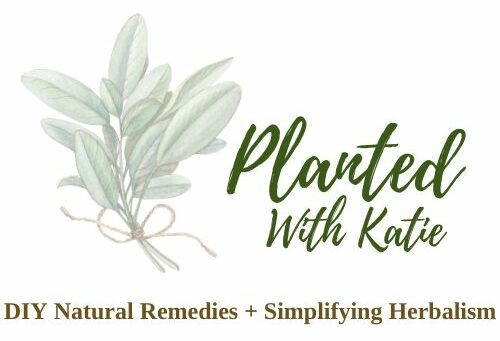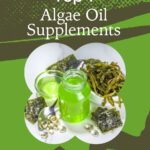7 Best Algae Supplements in 2023 (Omega, DHA, & EPA)
In the quest for optimal health, we're always on the lookout for nature's most potent, nutritious remedies. Finding the Best Algae Supplements should be at the top of your list! Here's why...

This post may include affiliate links. Please refer to our disclaimer for full disclaimer.
This is not to be taken as medical advice.
The world of health supplements is always buzzing with excitement and hope, and algae supplements are stealing the spotlight. These unassuming green powerhouses, derived from marine algae, are rewriting the book on essential nutrients, particularly omega-3 fatty acids.
So, if you're eager to explore the "7 Best Algae Supplements in 2023", you're in the right place. Join us for this chat about 7 of the best supplements, their incredible health benefits, and how they might just become your new wellness allies. Whether you're a seasoned health enthusiast or just embarking on your wellness journey, the world of algae supplements has something special to offer.

In the realm of dietary supplements, omega-3 fatty acids have captured the spotlight for their exceptional health benefits. These essential fats play a crucial role in our well-being, influencing everything from heart health to brain function.
But when we talk about omega-3s, fish oil often takes center stage. In recent years, however, there's been a notable shift towards plant-based alternatives, and one particular star has emerged in this arena: algae supplements.
Algae Supplementation: A Plant-Based Powerhouse
Algae, often associated with its aquatic habitat and vivid colors, might not seem like an obvious choice for health supplementation. However, these incredible organisms are a rich source of omega-3 fatty acids, making them a viable and sustainable alternative to traditional fish oil supplements.
We'll explore the world of algae supplements and uncover the top choices for those seeking plant-based omega-3s. Whether you're a devoted vegan or simply looking for a clean, eco-friendly source of essential fatty acids, this guide will provide insights into the health benefits of algae supplements and help you navigate the vast ocean of options available.
Bridging the Nutrition Gap
In a world where busy lifestyles and dietary restrictions can sometimes create nutritional gaps, finding the right supplements is crucial. Algae supplements are increasingly gaining recognition for their potential to bridge these gaps, offering a convenient, eco-conscious solution.
In today's fast-paced world, balancing work, family, and personal time can sometimes leave us with nutritional gaps in our diets. These gaps can affect our overall health and well-being. That's where algae supplements come into play, and they're making quite a splash in the world of nutrition.

These supplements, derived from marine algae, provide a unique and eco-friendly solution to help us fill those nutritional voids. So, let's dive into the world of algae and discover the seven best algae supplements in 2023.
Why Are Omega-3 Fatty Acids Essential?
The Importance of Essential Fatty Acids
You've probably heard of omega-3 fatty acids being labeled as "essential," and there's a good reason for that. These fats play a vital role in keeping our bodies in top shape. But here's the catch: our bodies can't whip up these essential fatty acids on their own. Nope, we need to get them from what we eat or through supplements.
Omega-3s come in several varieties, but the main stars are eicosapentaenoic acid (EPA), docosahexaenoic acid (DHA), and alpha-linolenic acid (ALA).
EPA and DHA are found in fatty fish like salmon, mackerel, and sardines. These two are like the brain food for your heart. They help maintain cardiovascular health, reduce inflammation, and lower blood pressure. Plus, they play a crucial role in brain function, making them a brain-boosting bonus.
Alpha-linolenic Acid (ALA) vs. Marine Omega-3s
Omega-3s come in various forms, and one of the primary distinctions is between alpha-linolenic acid (ALA) and marine omega-3s like docosahexaenoic acid (DHA) and eicosapentaenoic acid (EPA).
ALA is found in plant-based sources like flax seeds and walnuts, while marine omega-3s are typically associated with fatty fish. While it's not as potent as EPA and DHA, ALA is no slouch. It converts into small amounts of EPA and DHA in your body, offering some of the same heart-healthy perks.
The Role of DHA and EPA
DHA and EPA are the heavy hitters among omega-3s when it comes to health benefits. DHA plays a pivotal role in brain function and maintaining healthy cell membranes. EPA, on the other hand, contributes to heart health and helps reduce inflammation.
Omega-3s and Brain Function
Among the many health benefits attributed to omega-3s, their impact on brain function stands out. DHA, in particular, is essential for brain development and maintenance throughout life. Research indicates that adequate DHA levels may support cognitive function and even reduce the risk of conditions like Alzheimer's disease (Dangour et al., 2010).

The Main Health Benefits of Algal Oil Supplements
Overall Health Enhancement
Algae supplements offer a comprehensive package of health benefits. They're not only rich in omega-3s but also provide other essential nutrients. This makes them an excellent choice for promoting overall health and well-being.
Heart Health and Algal Oil
Cardiovascular disease is a leading cause of mortality worldwide. Omega-3s, especially DHA and EPA, have been linked to improved heart health. They can lower blood pressure, reduce triglycerides, and decrease the risk of heart disease.
These fatty acids have a unique ability to support the cardiovascular system by reducing inflammation, improving blood vessel function, and helping to maintain proper heart rhythm. Such effects may be especially beneficial for those at risk of heart disease or aiming to enhance their cardiovascular health.
Omega-3s and the Immune System
In an era where immune health is paramount, omega-3s have a crucial role to play. They support the immune system by reducing inflammation and enhancing its antimicrobial properties. This can help your body fend off infections and stay resilient.
Omega-3s' anti-inflammatory properties can help balance the immune response, preventing it from becoming overly aggressive, which can lead to autoimmune conditions. Furthermore, omega-3s enhance the immune system's ability to defend against harmful pathogens. They help the immune cells function efficiently, making it easier for your body to fight off infections.
By incorporating algae-based omega-3 supplements into your diet, you're taking proactive steps to strengthen your body's defenses, particularly in today's world where immune health is of utmost importance.
The Immense Potential of Algal Oil
Algal oil, the primary source of omega-3s in algae supplements, is a game-changer. It provides all the health benefits of traditional marine omega-3s without the ethical and environmental concerns associated with fishing. Not only does it offer the same remarkable advantages for your health, but it also does so without depleting marine ecosystems.
This sustainable source of omega-3s ensures that you're not only benefiting your health but also supporting the health of our planet. By choosing algal oil, you're making an eco-conscious decision that aligns with your health and environmental values.

A Closer Look at Algal Oil Supplements
How Algal Oil is Sourced
Algal oil is typically derived from marine algae, such as microalgae and seaweed. These tiny, nutrient-packed organisms serve as the foundation for the entire marine food chain. By harvesting algal oil, we can tap into a potent source of omega-3s without disrupting the marine ecosystem.
Unlike fish oil, which requires the capture and processing of fish, algal oil is produced through sustainable cultivation methods. This means that you can enjoy the benefits of omega-3s without contributing to overfishing or harming aquatic life.
Algal Oil vs. Krill Oil
Krill oil is another alternative to fish oil, often praised for its sustainability. However, when we compare algal oil and krill oil, algal oil emerges as a more eco-conscious choice. Krill, small shrimp-like creatures, play a crucial role in the marine ecosystem as a primary food source for various marine animals, including whales and penguins.
Harvesting krill for oil can disrupt this delicate balance. On the other hand, algal oil is directly sourced from algae, which are lower on the food chain and reproduce rapidly, making them a more sustainable source of omega-3s. Additionally, algal oil supplements tend to be free from potential allergens like shellfish, making them a safe choice for those with allergies or dietary restrictions.

Algae Supplements for Specific Health Needs
Joint Mobility and Algae Supplements
Research suggests that omega-3s, especially EPA, may help reduce joint inflammation. This can be a game-changer for those dealing with conditions like rheumatoid arthritis.
Omega-3s and Immune Health
In an era where bolstering the immune system is paramount, omega-3s have emerged as valuable assets. They enhance immune function by reducing inflammation and strengthening your body's defenses.
Omega-3s and Heart Health
Cardiovascular disease is a leading cause of mortality worldwide. Omega-3s, especially DHA and EPA, have been linked to improved heart health. They can lower blood pressure, reduce triglycerides, and decrease the risk of heart disease.
Omega-3s and Brain Health
Among the many health benefits attributed to omega-3s, their impact on brain function stands out. DHA, in particular, is essential for brain development and maintenance throughout life. Research indicates that adequate DHA levels may support cognitive function and even reduce the risk of conditions like Alzheimer's disease.
The Science Behind Algae Supplements
Clinical Trials and the Remarkable Results
Clinical trials have consistently shown the efficacy of omega-3 supplements (see references), including those derived from algae. They've been linked to improved cardiovascular health, reduced inflammation, and enhanced cognitive function.
The Role of the FDA: Ensuring Safety and Quality
The U.S. Food and Drug Administration (FDA) monitors dietary supplements to ensure their safety and quality. Look for supplements that have undergone rigorous testing and meet FDA standards.
Algae Supplements in Drug Administration
Some algae-based medications have been approved by the FDA, showcasing the potential of algae in the pharmaceutical industry. These medications often use algal compounds for specific health purposes.
The Research Behind Omega-3's
In the dynamic realm of omega-3 research, exciting breakthroughs are a common occurrence. Recent studies have been unearthing new dimensions of the benefits offered by these essential fatty acids, particularly in the form of algae supplements. Let's dive into some of these groundbreaking discoveries:
Cardiovascular Disease Prevention
Modern research keeps affirming the heart-healthy properties of omega-3s. Studies have shown that a consistent intake of these fatty acids, often facilitated by algae supplements, can reduce the risk of cardiovascular diseases like heart attacks and strokes. Omega-3s do this by curbing inflammation, lowering triglycerides, and promoting overall cardiovascular health.
Cognitive Decline Mitigation
Cognitive health is a subject of immense interest, and omega-3s have been stepping into the spotlight. Recent studies are shedding light on the potential of these essential fatty acids to stave off cognitive decline, including age-related conditions like Alzheimer's disease. While research is ongoing, the findings thus far are encouraging, hinting at a brighter future for cognitive health support.
Joint Mobility Enhancement
Omega-3s aren't just good for the heart and brain; they can be a friend to your joints too. Emerging research suggests that omega-3 supplementation may play a role in improving joint mobility, making it particularly appealing for those with arthritis or joint discomfort.
Mood and Emotional Well-Being
Beyond the physical aspects, omega-3s also seem to extend their benefits to emotional well-being. Some studies have explored their potential in alleviating symptoms of depression and anxiety. While they're not a substitute for professional mental health treatment, omega-3s may offer a supplementary avenue for those seeking emotional balance.
Eye Health
The eyes, often called the windows to the soul, also deserve some omega-3 love. Ongoing research is examining the role of these fatty acids in maintaining eye health, particularly in conditions like age-related macular degeneration (AMD).
The results could hold significant implications for preserving vision as we age.As the pages of scientific inquiry continue to turn, omega-3 research marches forward, uncovering new layers of their multifaceted benefits. These discoveries reaffirm the significance of omega-3s, especially those sourced from algae, as vital contributors to overall health and well-being.

Choosing the Best Algae Supplement
Plant-Based Sources of Omega-3s
For those following a plant-based diet, algae supplements are a godsend. They offer a clean, cruelty-free source of omega-3s without relying on animal products.
No Fillers
When it comes to choosing the best algae supplements (or any supplements for that matter), be sure to check the ingredients for any fillers or additives.
You want your supplement ideally to be just the algae oil itself and the capsule it comes in. You can also just get a pure algae oil in the oil form itself, but it might not taste so great.
Avoiding the Fishy Aftertaste
One common complaint about fish oil supplements is the unpleasant aftertaste. Algae supplements, on the other hand, typically don't leave you with that fishy burp. They provide a more palatable solution.
The Convenience of Soft Gels
Algae supplements often come in soft gel form, making them easy to swallow. This convenience factor can make it simpler to incorporate them into your daily routine.
Top 7 Algae Supplements in 2023
As we're learning about quality algae supplementation, it's essential to highlight some of the best algae supplements for 2023. These supplements are carefully selected based on their ability to provide essential nutrients, promote overall health, and address specific dietary needs.
1. Naturalis Vegan Omega 3
If you're looking for a high-potency omega-3 supplement that supports cardiovascular and cognitive health, Naturalis is an outstanding choice. With a focus on delivering ample doses of EPA and DHA, it's ideal for individuals aiming to optimize their omega-3 intake.
2. Future Kind Essential Omega-3
Crafted especially for vegans, Future Kind's Essential Omega-3 supplement is a testament to sustainable, plant-based nutrition. It offers a combination of DHA and EPA, filling the nutrient gaps often encountered in plant-based diets. This option prioritizes ethical and eco-conscious supplementation.
3. Nordic Naturals Algae Omega
A well-established name in the world of omega-3s, Nordic Naturals consistently delivers supplements known for their purity and quality. The Algae Omega supplement is no exception. Packed with both DHA and EPA, it caters to those seeking a reliable source of heart and brain support.
4. Garden of Life Omega-3 Algae Oil
For a supplement that excels in promoting cardiovascular and cognitive well-being, Garden of Life's Omega-3 Algae Oil is a top pick. This product boasts a robust combination of DHA and EPA, derived from sustainably cultivated algae, ensuring both quality and environmental responsibility.
5. Nature's Way NutraVege Omega-3
Nature's Way offers a plant-based omega-3 supplement that appeals to the health-conscious consumer. With high doses of DHA and EPA, it supports heart and brain health while aligning with ethical dietary choices.
6. Sports Research Vegan Omega-3
Athletes and fitness enthusiasts seeking omega-3 supplementation often turn to Sports Research's Vegan Omega-3. It provides a robust dose of DHA and EPA, crucial for joint mobility and overall health.
7. Source Naturals Vegan Omega-3s
Source Naturals presents a vegan-friendly omega-3 supplement that combines DHA and EPA for comprehensive health benefits. It caters to those who prioritize vegan and sustainable options while striving for optimum well-being.
These top seven algae supplements offer a diverse range of benefits, allowing you to choose the one that best aligns with your dietary preferences and health goals. Whether you're vegan, eco-conscious, or simply looking to enhance your overall health, there's an algae supplement to support your journey.
The Future of Omega-3 Supplementation
Eco-Friendly Choices for the Future
As sustainability becomes an ever-pressing concern, algae supplements offer a more eco-conscious option for omega-3 supplementation. They don't deplete marine resources or disrupt the marine ecosystem.
Personal Preference Matters
Selecting the right algae supplement comes down to personal preference. Factors like dosage, source, and additional ingredients may influence your choice. It's also important to get advise from your healthcare provider on this matter.

Embrace Better Health with Algae Supplements
In conclusion, algae supplements have earned their place in the spotlight for their exceptional health benefits. They provide an eco-friendly, plant-based source of essential fatty acids without the concerns associated with traditional fish oil supplements.
In the realm of nutritional supplements, algae supplements have surged to prominence, revolutionizing the way we approach omega-3 intake. As we wrap up our exploration of the "7 Best Algae Supplements in 2023," it's clear that these supplements are far more than just an alternative to fish oil. They represent a profound shift towards sustainable, plant-based nutrition, brimming with health benefits.
From the essential fatty acids that support cardiovascular health to the brain-boosting DHA, algae supplements offer a comprehensive package of nutrition. Their positive impact on immune health, joint mobility, and overall well-being cannot be overstated.
Moreover, these supplements bring convenience, ease of consumption, and the absence of a fishy aftertaste, making them a practical addition to your daily routine.
As we look to the future, algae supplements shine as a beacon of sustainability in the supplement industry. By choosing them, we not only enhance our own health but also contribute to the well-being of our planet.
In the end, selecting the best algae supplement is a deeply personal choice, influenced by your health needs, preferences, and values. Whether you opt for high doses of EPA, a blend of DHA and EPA, or a supplement enriched with vitamin E, you're taking a step towards a healthier, more sustainable lifestyle.
So, embrace better health in 2023 and beyond by incorporating algae supplements into your daily routine. These small soft gels hold the power to make a significant impact on your health, proving that when it comes to well-being, it's the small changes that can lead to the most profound transformations. Here's to your health and a brighter, algae-powered future.
Other Ways to Get Algae in Your Diet
While supplements are a convenient option, they're not the only way to incorporate the goodness of algae into your diet. Algae, specifically seaweed, has been a dietary staple in many coastal regions for centuries. Here are some creative ways to introduce algae into your daily meals:

Seaweed Snacks
Seaweed snacks have gained popularity in recent years, and for a good reason. They come in various flavors, from lightly salted to spicy, and offer a satisfying crunch while being incredibly nutritious. You can munch on these as a guilt-free snack or crumble them into salads for an extra burst of umami and minerals.
Sushi Rolls
If you enjoy sushi, you're already familiar with one of the most delicious ways to consume seaweed. Nori, a type of seaweed, wraps around rice, vegetables, and seafood to create those delectable sushi rolls. Not only does nori impart a unique flavor, but it also contributes an array of vitamins and minerals to your meal.
Algae Powder
Algae powders, derived from spirulina or chlorella, are versatile and easy to incorporate into your diet. You can blend them into smoothies, mix them into yogurt, or even add a spoonful to your salad dressings. These powders are nutrient-dense and can elevate the health benefits of your favorite dishes.
Algae as a Condiment
In many Asian cuisines, algae-based condiments like furikake and dulse flakes are used to season dishes. Sprinkle them over rice, noodles, or roasted vegetables for an extra layer of flavor and a nutritional boost.
Algae-Based Broths
Algae-based broths, such as kombu or kelp broth, are the secret ingredients in many savory dishes. They impart a rich, savory flavor known as umami, making them an excellent addition to soups, stews, and risottos.
These methods not only diversify your diet but also provide you with essential nutrients from algae while adding unique flavors and textures to your meals. So, whether you're a seaweed enthusiast or a newcomer to algae-rich foods, there are plenty of options to explore and savor.
Other Articles You Might Like
References
Dangour, A. D., Allen, E., Elbourne, D., Fasey, N., Fletcher, A. E., Hardy, P., ... & Uauy, R. (2010). Effect of 2-y n-3 long-chain polyunsaturated fatty acid supplementation on cognitive function in older people: a randomized, double-blind, controlled trial. The American journal of clinical nutrition, 91(6), 1725-1732.
SanGiovanni, J. P., & Chew, E. Y. The role of omega-3 long-chain polyunsaturated fatty acids in health and disease of the retina. Progress in Retinal and Eye Research, 2005.
Parekh, N., Voland, R. P., & Moeller, S. M. Association between dietary fat intake and age-related macular degeneration in the Carotenoids in Age-Related Eye Disease Study (CAREDS). Archives of Ophthalmology, 2009.
Mischoulon, D., & Freeman, M. P. Omega-3 fatty acids in psychiatry. Psychiatric Clinics of North America, 2013.
Grosso, G., Galvano, F., & Marventano, S. Omega-3 Fatty Acids and Depression: Scientific Evidence and Biological Mechanisms. Oxidative Medicine and Cellular Longevity, 2014.
Goldberg, R. J., & Katz, J. The role of (omega)-3 long-chain polyunsaturated fatty acids in health and disease of the retina. Progress in Retinal and Eye Research, 2007.
Cleland, L. G., James, M. J., & Proudman, S. M. Fish oil: what the prescriber needs to know. Arthritis Research & Therapy, 2006.
Zhang, Y. P., Miao, R. P., & (Omega)-3 polyunsaturated fatty acids reduce T-lymphocyte apoptosis in advanced tuberculosis patients through the fatty acid receptor KLF2. Journal of Inflammation, 2015.
Yassine, H. N., Braskie, M. N., & Mack, W. J. Association of docosahexaenoic acid supplementation with Alzheimer disease stage in apolipoprotein E epsilon4 carriers: a review. JAMA Neurology, 2017.
Mozaffarian, D., Wu, J. H. Y., & (Omega)-3 Fatty Acids and Cardiovascular Disease: Effects on Risk Factors, Molecular Pathways, and Clinical Events. Journal of the American College of Cardiology, 2011.
Bernasconi, A. A., Wiest, M. M., & Lavie, C. J. (Omega)-3 Polyunsaturated Fatty Acids in Hypertriglyceridemia: An Endocrine Society Clinical Practice Guideline. The Journal of Clinical Endocrinology & Metabolism, 2019.



